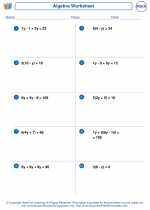Series
A series is the sum of the terms of a sequence. A sequence is a set of numbers in a specific order, and a series is the sum of those numbers. There are various types of series, such as arithmetic series, geometric series, and more. Understanding series is important in mathematics as it is used in various applications, including finance, engineering, and science.
Types of Series
- Arithmetic Series: In an arithmetic series, each term is obtained by adding a constant difference to the previous term. The sum of the first n terms of an arithmetic series can be found using the formula Sn = n/2 * (a1 + an), where Sn is the sum of the first n terms, a1 is the first term, and an is the nth term.
- Geometric Series: In a geometric series, each term is obtained by multiplying the previous term by a constant ratio. The sum of the first n terms of a geometric series can be found using the formula Sn = a1 * (1 - rn) / (1 - r), where Sn is the sum of the first n terms, a1 is the first term, and r is the common ratio.
- Infinite Series: An infinite series is the sum of an infinite sequence of numbers. Some infinite series converge to a finite sum, while others diverge to infinity or negative infinity.
Convergence and Divergence
Whether an infinite series converges or diverges is an important concept in series. A series converges if the sequence of partial sums approaches a finite limit as the number of terms increases indefinitely. On the other hand, a series diverges if the sequence of partial sums does not approach a finite limit.
Study Guide
To understand series better, it's important to practice solving problems related to arithmetic and geometric series. Here are some key points to focus on:
- Understand the difference between a sequence and a series.
- Practice finding the sum of the first n terms of arithmetic and geometric series using the relevant formulas.
- Explore the concept of convergence and divergence of infinite series.
- Solve problems that involve real-life applications of series, such as calculating interest in finance or analyzing growth patterns in science and engineering.
By mastering these concepts and practicing related problems, you'll gain a solid understanding of series and be well-prepared for any series-related questions or applications.
.◂Math Worksheets and Study Guides Eighth Grade. Solving linear equations
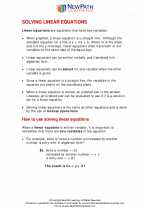
 Worksheet/Answer key
Worksheet/Answer key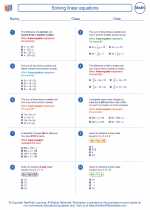
 Worksheet/Answer key
Worksheet/Answer key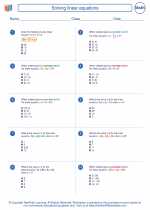
 Worksheet/Answer key
Worksheet/Answer key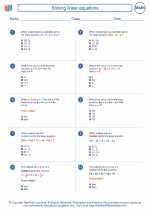
 Worksheet/Answer key
Worksheet/Answer key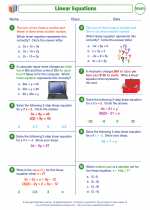
 Worksheet/Answer key
Worksheet/Answer key